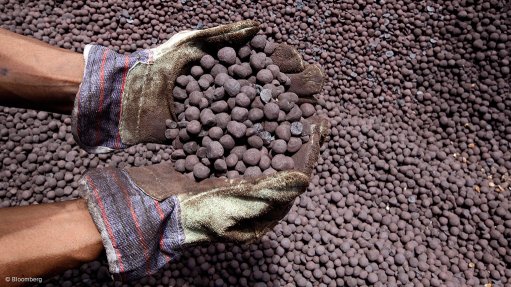South Africa urged to recycle more of its copper scrap
Given limited domestic copper production, South Africa should prioritise the recycling of copper scrap to ensure there remains sufficient stock as the economy becomes more energy efficient and less reliant on fossil fuels, Copper Development Association Africa (CDAA) executive chairperson Evert Swanepoel has said.
He was a panellist in a DRC Mining Week webinar, focused on the use of copper in renewable energy technologies and electric vehicles (EVs), held on July 9.
Swanepoel pointed out that two-thirds of all copper ever produced is still in use.
However, he also noted that copper was increasingly in short supply in South Africa as only the Palabora Copper mine remains operational to supply the domestic market.
Swanepoel said the mine was nearing the end of its life, while a planned new copper mine in the town of Prieska in the Northern Cape, being developed by explorer and developer Orion Minerals, was due to come on line only in 2023.
The domestic supply of copper is further strained as a result of South Africa exporting a large volume of its copper scrap metal to overseas recyclers, thereby exposing lower volumes to local recyclers, said Swanepoel.
He said this left the country with two options. “We can either import copper raw material or use recycled copper.”
He noted that recycled copper was preferential to South African manufacturers as it required significantly less energy to melt, as opposed to manufacturing products from raw material. “However, the main issue is that the government has allowed the export of South African recyclable copper material to various parts of the world.”
In an effort to assist domestic recyclers, Swanepoel pointed out that the CDAA had been engaging with government on the matter. “[The CDAA] spends about 30% of our time trying to convince government to keep scrap copper within South Africa.”
A small victory in this regard was achieved recently, when on July 3 government effected the gazetting of the cessation of export of copper scrap, he enthused. However, he said this action was somewhat based on Covid-19-related restrictions on the export of a range of products, hinting that it may not last forever.
EV & RENEWABLES TRANSITION
South Africa also stands to benefit from a looming global transition from fossil-fuel-burning vehicles, to hybrids and more specifically, pure EVs, as local original-equipment manufacturers are expected to eventually shift to meet a growing international demand for EVs.
This will mean South Africa will require more copper to build EVs.
He pointed out that conventional fossil fuel-burning vehicles contain about 25 kg of copper, while hybrids contain about 50 kg and pure EVs about 75 kg.
These factors mean that copper will be an increasingly critical commodity in the move from a high-carbon economy, to a low-carbon economy, Swanepoel said.
In addition, renewable energy generation technologies also require increased volumes of copper.
Swanepoel pointed out that 70% of all copper mined is used in electricity applications, from generation, through to distribution and to the products that consumes it. For instance, in terms of conventional fossil-fuelled power technologies, Swanepoel highlighted that every megawatt of installed capacity would require 0.5 t of copper. On the renewables spectrum, for every megawatt produced by wind power technology, he says about 3.6 t of copper is used, and this figure increases to 4.5 t per megawatt for solar photovoltaic technologies.
Comments
Press Office
Announcements
What's On
Subscribe to improve your user experience...
Option 1 (equivalent of R125 a month):
Receive a weekly copy of Creamer Media's Engineering News & Mining Weekly magazine
(print copy for those in South Africa and e-magazine for those outside of South Africa)
Receive daily email newsletters
Access to full search results
Access archive of magazine back copies
Access to Projects in Progress
Access to ONE Research Report of your choice in PDF format
Option 2 (equivalent of R375 a month):
All benefits from Option 1
PLUS
Access to Creamer Media's Research Channel Africa for ALL Research Reports, in PDF format, on various industrial and mining sectors
including Electricity; Water; Energy Transition; Hydrogen; Roads, Rail and Ports; Coal; Gold; Platinum; Battery Metals; etc.
Already a subscriber?
Forgotten your password?
Receive weekly copy of Creamer Media's Engineering News & Mining Weekly magazine (print copy for those in South Africa and e-magazine for those outside of South Africa)
➕
Recieve daily email newsletters
➕
Access to full search results
➕
Access archive of magazine back copies
➕
Access to Projects in Progress
➕
Access to ONE Research Report of your choice in PDF format
RESEARCH CHANNEL AFRICA
R4500 (equivalent of R375 a month)
SUBSCRIBEAll benefits from Option 1
➕
Access to Creamer Media's Research Channel Africa for ALL Research Reports on various industrial and mining sectors, in PDF format, including on:
Electricity
➕
Water
➕
Energy Transition
➕
Hydrogen
➕
Roads, Rail and Ports
➕
Coal
➕
Gold
➕
Platinum
➕
Battery Metals
➕
etc.
Receive all benefits from Option 1 or Option 2 delivered to numerous people at your company
➕
Multiple User names and Passwords for simultaneous log-ins
➕
Intranet integration access to all in your organisation
















